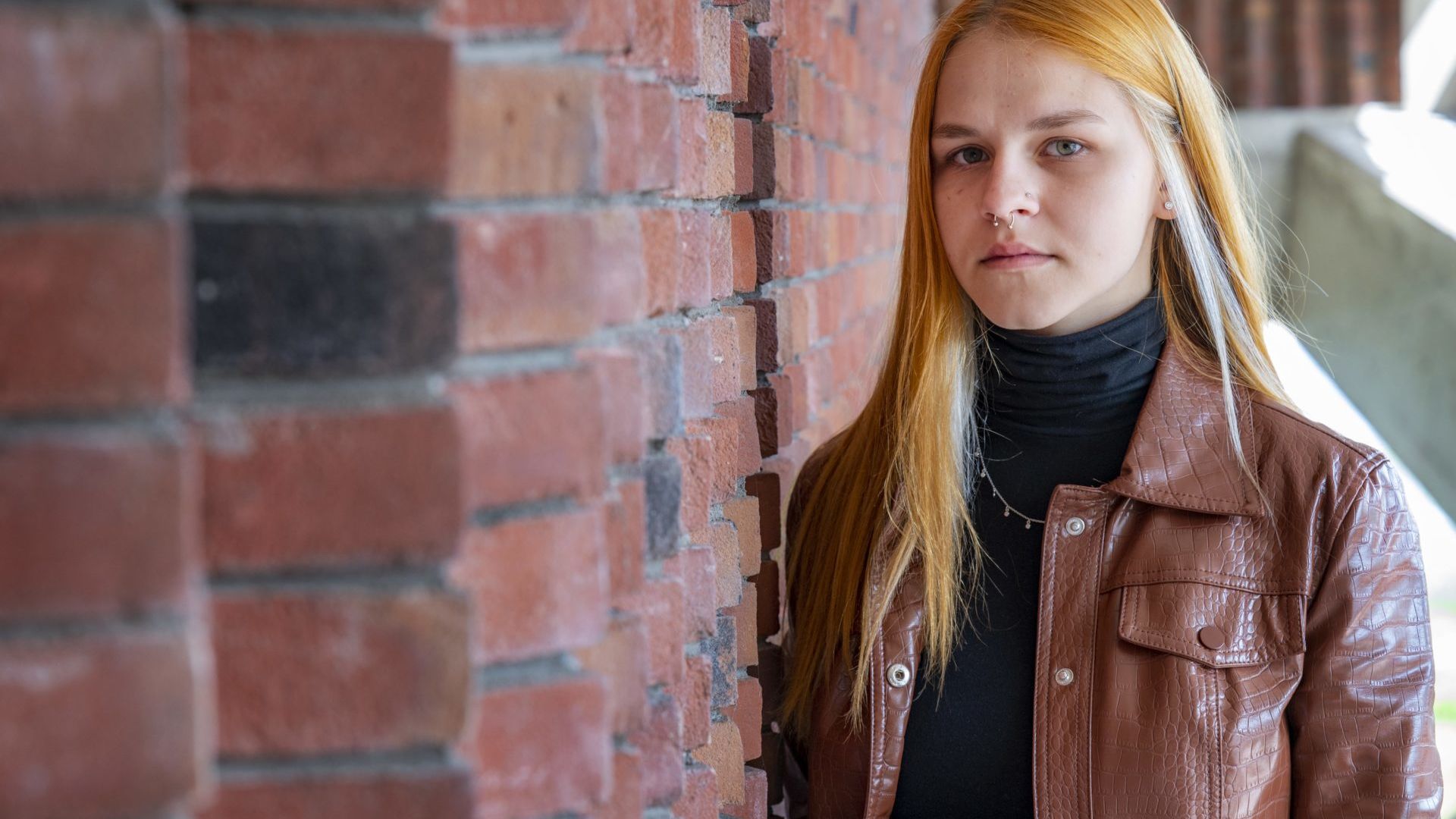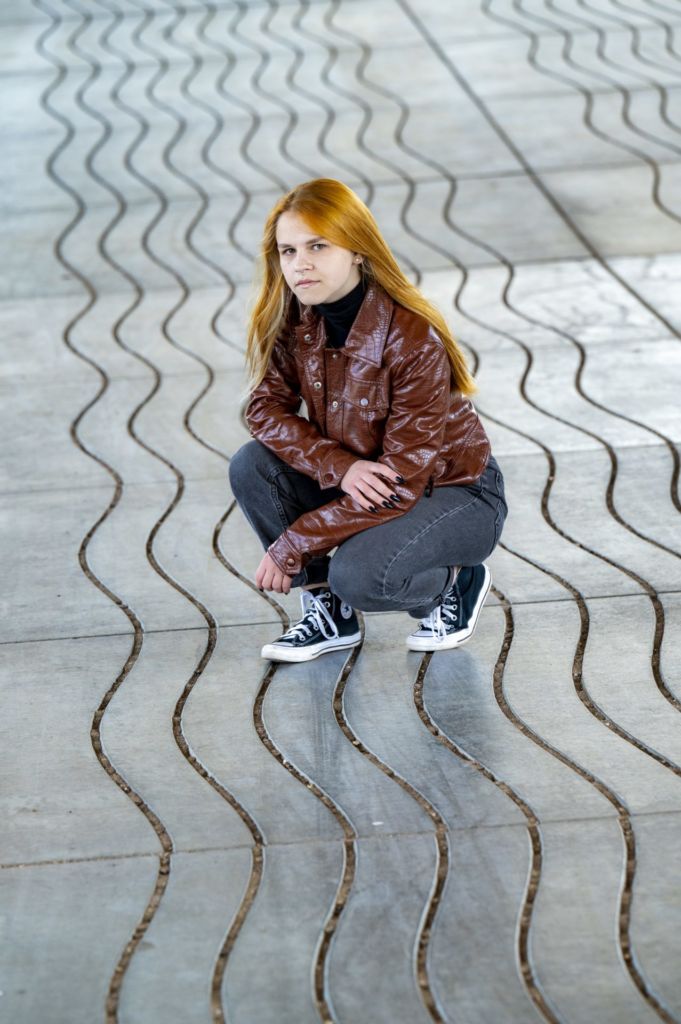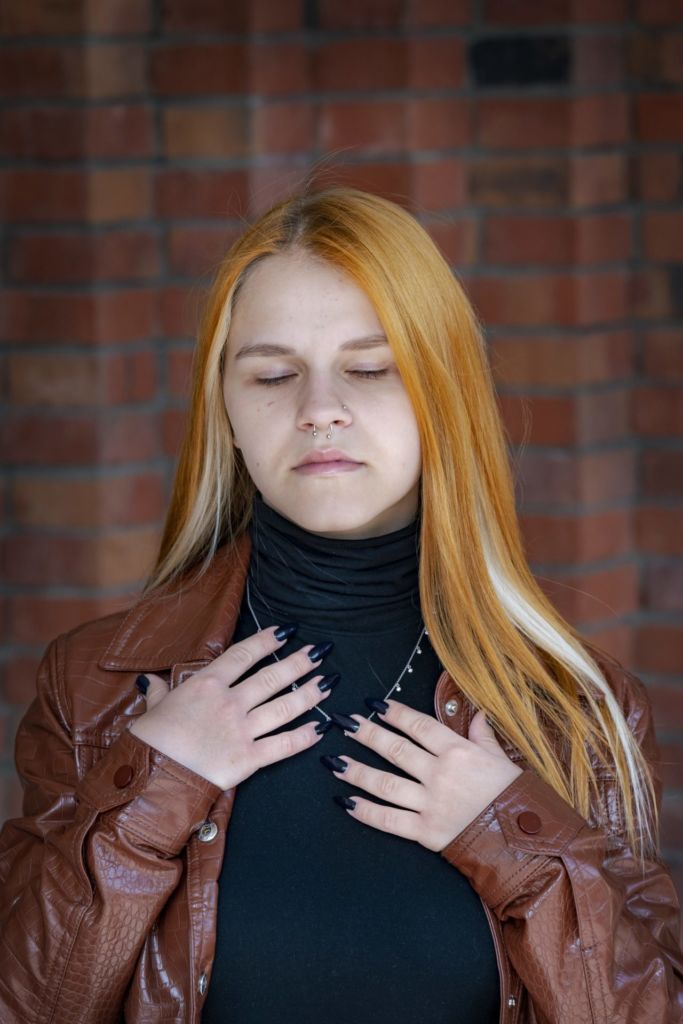Summer interview (1): ‘One day we will be free’
-
 Sofiia Shtohryn Foto: Bert Beelen
Sofiia Shtohryn Foto: Bert Beelen
Sofiia Shtohryn was only 17 when she arrived in Nijmegen last September. The Ukrainian started her studies in Biology at Radboud University, not knowing that a few months later war would break out in her home country. Her birthplace Chernihiv was bombed in the past months, and her family was in danger. ‘You feel helpless and guilty about being here.’
She doesn’t mind talking about the war, says Sofiia Shtohryn emphatically. What she wants is to help raise awareness, because we clearly don’t know everything that is going on. But it is also tiring for her. For months, she has lived in uncertainty about her parents. Her home. Her country. In the meantime, she also had to ‘just’ sit exams in Nijmegen.
Summer interviews
This is the first episode of a series of summer interviews. The articles will also appear in Vox magazine, which will be distributed on campus this week. You can find the magazines in the special magazine bins in almost all university buildings.
It’s been a pretty rough time, she now admits. Sometimes, Shtohryn was unable to reach her mother for days because the telephone lines were down, and she did not know whether her mother was still alive. By now, her mother and two grand-mothers have found refuge in Nijmegen. Her father and step-father are not allowed to leave the country because of the general mobilisation.
What have the past months been like for you?
‘It was the only thing I could think about. I posted lots of photos from independent Ukrainian news websites on my social media to tell people the truth about what was happening. Because some people are still talking about it in terms of a crisis or conflict, but it’s a war. Maybe even genocide. This made me feel frustrated, so I had to do something. I also read the news all day long. Because I’m a member of twenty or more groups on Telegram and follow a lot of news sites, I was getting a lot of information. I also attended protests in the Netherlands, and stayed in
close contact with my family. I sometimes called my mother five times a day.’
What were these phone calls like?
‘Scary. I remember that on 24 March at 6 a.m., the phone rang. I was still in bed in my student house; I picked up the phone and heard my mother say: “The Russians are here; we’re at war.” can’t describe how that felt. It was like a bad dream or a film.’ Shtohryn looks out of the window as she remembers that moment. We are in the conference room of the editorial office, looking out over the grass fields in front of the Maria Montessori building. After a short silence, she continues.
‘My mother told me about planes flying overhead, about the city being bombed’
‘After that, we called each other very often. My mother told me about planes flying overhead, about the city being bombed. Chernihiv is a suburb of Kyiv, so the situation there was very severe. My family had no electricity, no water, and sometimes no telephone connection for days at a time. I didn’t know for sure whether my mother was still alive. Many of my friends are still there. And it’s not safe to run away, because the Russians are also shooting at civilians. In the end, my mother and two grand-mothers decided to flee to Nijmegen. My landlord didn’t allow
them to live with me because of the rental contract rules, so I had to arrange accommodation for them. In the meantime, I also had exams and I had to study.’
Wasn’t that very hard, psychologically?
‘At such times, you feel helpless and guilty about being here, because you’re safe. I tried to deal with my feelings by naively believing that the war would end soon. The worst days were when some presidential advisor or other said that the war could still last for months, or even years. When I saw images of the state my city was in, I felt even worse. One day, I tried to distract myself by going to a party, but of course, that didn’t help: I only felt worse.’

Does she want to share some of these images? Of course. She takes out her telephone and scrolls down her photo gallery. ‘There are so many,’ she apologises. ‘My father sends me photos every day of what is happening in our city.’ It’s easier to search for Chernihiv on Google. Look! A few seconds later, she points on her phone to a hotel near her parents’ home. The roof is completely collapsed and the outside facade destroyed. Rubble covers the street. Shtohryn used to walk past this hotel a lot.
The secondary school she went to was also bombed. Luckily, only the windows were broken, she explains. Under the building, there are bunkers, which turned out to be very useful. No one was wounded. But: bunkers under a school? There aren’t many Dutch schools that can boast having those. Shtohryn shrugs her shoulders and sighs.
You don’t seem surprised about the war breaking out.
‘I’m not. The area where I live is still very much influenced by Russian culture. In my city, there are lots of TV programmes and books in Russian, and most people only speak Russian. I also used to speak it with my family and friends: it’s only now that we’ve decided to switch completely to Ukrainian. I’ve always felt a certain tension and pressure from Russia. When I was 9 years old, the Revolution of Dignity took place in Ukraine. I remember one night, watching the news with my father and asking him: “Are the Russians going to attack us?” We always went to Crimea on our holidays, but after 2014, we couldn’t do that anymore. I haven’t been there since the annexation.’
And yet, it must also have been unexpected, since you were studying here and your family was there. What was it like to be reunited?
‘Very emotional. I’d lived for weeks in uncertainty, because my family didn’t know whether they should flee or not. When they suddenly decided to do it, it was very stressful to find a place where they could stay. A day after they left Ukraine, an important bridge was blown up. The idea that if they had waited a day longer they would have been unable to leave was very frightening, so when we saw each other, I was incredibly relieved. But I also have mixed feelings. My father and step-father are still there, and many old people in my hometown are still under the influence of Russian propaganda.’
How do you notice this?
‘Many people still watch the Russian news, and are influenced by it. They sometimes say that Russia had no choice and was forced by Ukraine to start this war. That makes me so angry.’
‘There is still homophobia, sexism, and racism. Many people don’t accept minorities.’
You can see the frustration in her eyes. She herself was raised with ‘European norms’, something that isn’t very common in the North of Ukraine. ‘Ukraine is, of course, a democratic country, but not fully. There is still homophobia, sexism, and racism. Many people don’t accept minorities. That’s why I became an activist. I remember having frequent disagreements with my classmates.’
Shtohryn is getting a lot of support from the Ukrainian community that has emerged in Nijmegen over the last months. Every Saturday at 10.30 a.m. she joins the Nijmegen4Ukraine platform on the Mariënburgplein, where a group of like-minded people meets to demonstrate and talk. ‘It’s nice to meet people who think and feel the same way I do,’ explains Shtohryn. ‘And to speak
my own language. It makes me feel less alone.’

There is also a lot of support at Radboud University. She is not an exchange student – as everyone always assumes – but a full-time Radboud University student. Why? Education in the Netherlands is really good, says Shtohryn. Seeing Ukrainian flags and the support of Dutch students makes her feel even more at home.
And yet, studying has not been easy. Since her parents were no longer able to work due to the war, Shtohryn didn’t have money to pay her rent and tuition fees. Her future in Nijmegen was uncertain. Luckily, the university came to her aid: they paid her rent so that she could stay. She was also given the opportunity to meet with a student counsellor to talk about her feelings.
How important do you find your studies right now?
‘Much less than I used to. In the beginning, I was studying all the time, and really doing my best, but now studying is no longer my priority. I used to get sevens and eights in my exams; now, it’s more likely to be a six. This is disappointing, even though I know that I shouldn’t be so hard on myself: I still passed all my tests this year. It’s just that I had so many plans for the future, and now I don’t really dare to hope anymore.’
What were those plans?
‘Completing a Bachelor’s, a Master’s, and maybe even a PhD in Nijmegen. I’ve always been interested in biology: I love animals, and I enjoyed working with them as a volunteer. But my future is uncertain. Right now, I don’t have enough money to stay here. I might get a job, but that wouldn’t cover my costs. The Dutch government is talking about lowering tuition fees for Ukrainian students. I really hope they do, because that would mean I could stay. Going back to my hometown doesn’t seem like an option now that all student life there has come to a standstill.’ [After this interview, universities decided to lower tuition fees, ed.]
How do you see the future of Ukraine?
‘Of course I’m worried about my country, but I’m also really sure that we will win. Putin doesn’t deserve a victory, and his army and economy are weak. I hope we can join the European Union; I really hope that will happen. This will give us more contact with EU countries, and make us more independent. I hope that our entire popupation will be proud of Ukraine, and that we’ll all be able to speak our mother tongue. One day, we will be free. But it could still take a while.’
This is why Sofiia Shtohryn isn’t planning to remain silent in the months to come. She has noticed that people sometimes forget that there is a war on. ‘It’s logical: you can’t be thinking about it all the time,’ she says. ‘But we’re not allowed to forget. And I don’t intend to keep silent if I hear someone say something untrue about Ukraine.’




Khrystyna schreef op 2 juni 2022 om 15:15
I’m very proud of you, my dear friend. You’ve helped me a lot during the beginning of the war when I was afraid of dying every day. You and all the ukrainians will have a wonderful future for sure. Слава Україні!